February 5, 2023
In the previous installment of this series (The Land-Part III), it was discovered, without intention to do so, that the prevailing information about the early land purchases of our subdivisions (dubbed Dickinsonia, by me), was not correct. Based on actual historical documents and records, the following are objective facts:
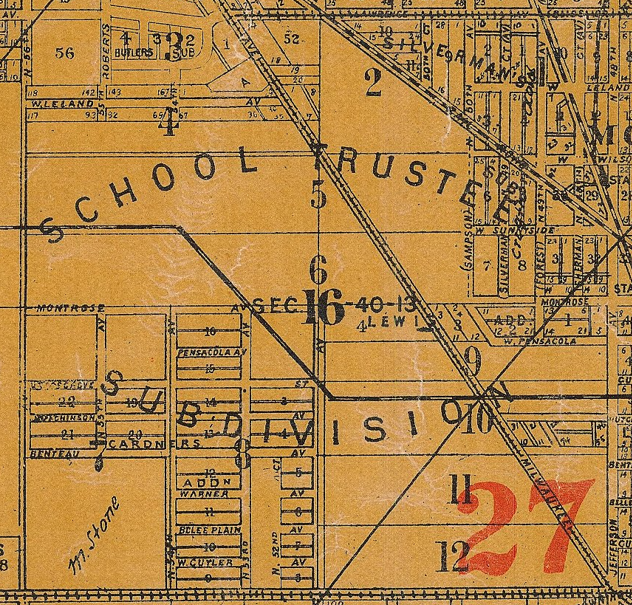
Original school land purchasers:
Andrew Fleming purchased Lot 12 in 1842
Chester Dickinson purchased Lot 11 in 1847
This information created a conundrum. Why do all the histories report that E.B. Sutherland sold the land and the Sutherland Inn to Chester Dickinson? In an attempt to try to understand this, I mused about the current rampant spread of inaccurate information and realized that this was probably not that different over the past centuries. There is usually a source or original piece of information that is deemed credible or authoritative, which then is regurgitated and morphs with each reporting, until the mutation becomes the accepted and unquestioned truth. And I am probably guilty of being one of the regurgitators, because, as an amateur and novice historian, I trust credible sources –but now as it turns out, not without questioning. So, here we are.
the possible source
The earliest published history that is most relevant to us, that I am aware of, is The History of Cook County Illinois, From the Earliest Period to the Present Time” by A.T. Andreas, 1884, in the chapter “History of Jefferson.” Since many subsequent articles reference this source, this is where we should start. Below is a clip from this book that I read several times previously, but now I tried to really analyze it:
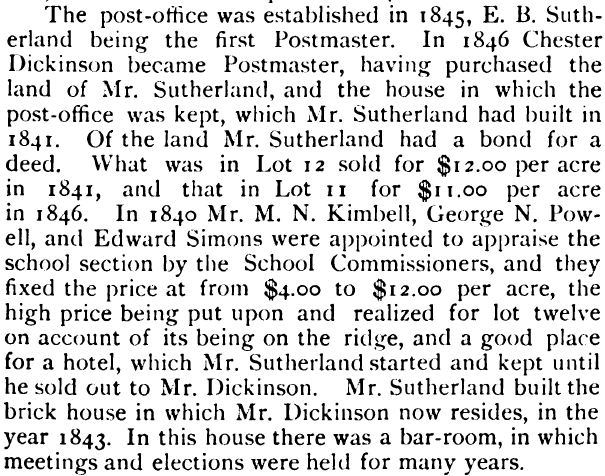
The most important sentence, that I glossed over in the past, holds a hugely significant phrase: “Of the land Mr. Sutherland had a bond for a deed.” A bond for a deed is some form of owner financing. So, right there, it is stating that E.B. was not the deed holder, therefore, not the owner, but that he had some kind of financial agreement related to the property.
The more I reread this paragraph, I am finding that, for the most part, the information being reported is correct, but the sequence of the statements creates the possibility of misinterpretation. For example, right after the “bond for deed” sentence, the price for Lots 12 and 11 are reported, making one think that those are related to Sutherland. The information in that sentence is (somewhat) correct but the purchasers are not identified, so we assume it was Sutherland. Due to the style of writing and the lack of continuity in chronology, I can see how misinterpretations occurred. So, I can understand how subsequent historians referenced this information and accepted it at a cursory level, without a deep dive analysis.
The hunt resumes
Obviously, I really needed to find or have access to the actual and official property records. But I hit a big obstacle at Chicago Title/Property Insight. So now what? I couldn’t quite accept that this was the end of the journey.
My friend, fortuity, came to my aid again.
I was downtown, down in the basement of the County Clerk’s office, working on gathering property records for the neighbors’ houses. I was looking for a specific subdivision and ran into a problem. I asked a staff person for assistance, who could not answer the question and when she saw I was not satisfied with an “I don’t know” response, she escalated the issue and a gentleman named JP came downstairs to help me. As he was investigating, I continued to work on what I was working on. JP was muttering to himself and I wasn’t really listening, though I did hear him say “maybe it’s in lands.” He turned around, pulled another book very briefly, and then seemed to dismiss whatever it was he was thinking. He eventually found my answer. Awesome guy (with bad sciatica).
Over the next few weeks, for some reason, “maybe it’s in lands” kept running through my head, and I had a feeling that I should not ignore this.
Maybe it’s in lands. Lands. Before there were subdivisions, there was only land. The Land.
During my next visit to the basement, I felt less focused than usual and just stood motionless for a time in my spot where I always camp out. In a sort of somnambulistic state, I slowly turned around 180 degrees, looked down at the books in the shelves, and…………. there they were: a few books that were labeled LANDS, not Subdivisions like all the rest. I pulled out book 186A. OMG…………………………
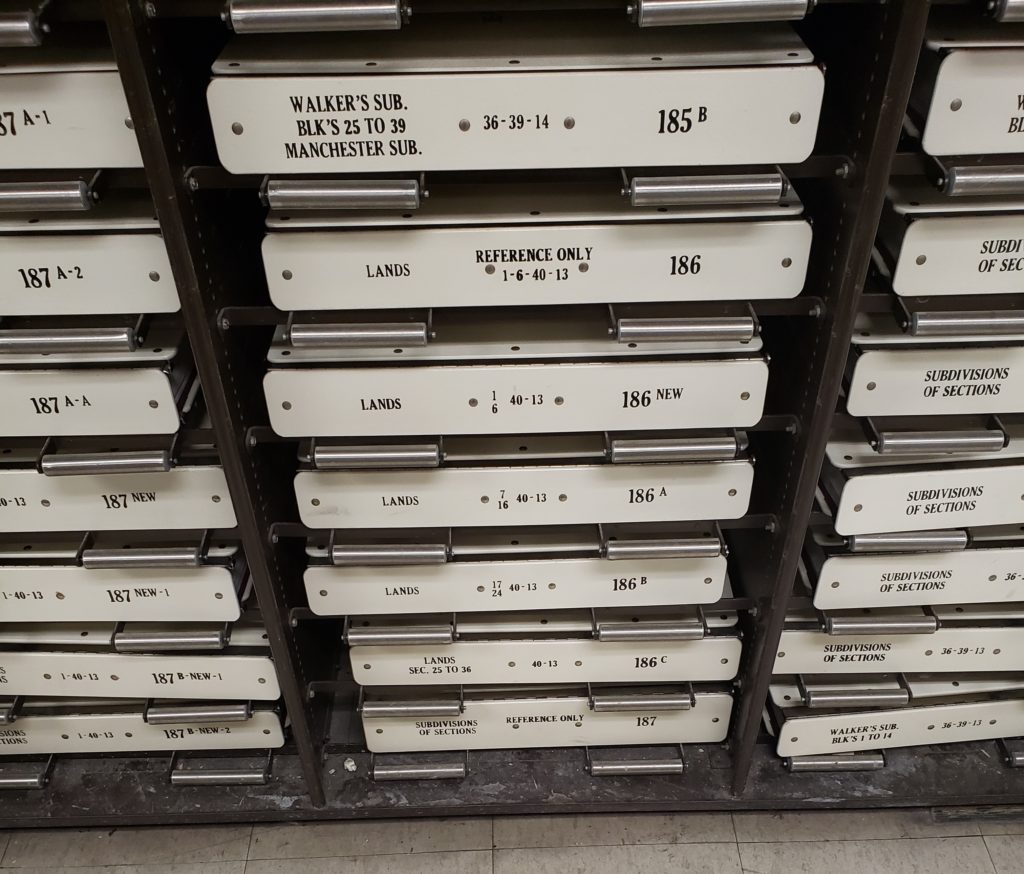
HOLY SHIT ! The elusive records were here all along! Here, literally under my nose. Ante-fire pre 1871 records! How could that be? Who cares! I’m having palpitations. Let me catch my breath.
the actual early property records
Drum roll —— below are copies of a portion of the “Lands” pages for Lot 11 and 12 before there were any subdivisions. As a reminder, school commissioners were required, by law, to divide up Section 16 into numbered lots, prior to sale, and create plats of the Section accordingly. The ante-fire transaction entries are in a section at the top of the pages for the Lot, labeled “Origin.” Entries are not necessarily in chronological order. Note that the year of the dates is 18xx, not 19xx – so 4-26-48 is April 26, 1848.
So, here we go with the analysis of Lot 12:
We see that Andrew Fleming was granted a deed in 1842 by the School Commissioners. He is the first person to own this piece of land. We already knew that but this is confirmation.
Now, we get to 1847:
In March, Chester and E.B. enter into some form of agreement – see Instrument column – “Agt.” So E.B. is definitely in the mix somehow.
Two months later, in May, the property deed is conveyed to Chester by Thomas Fleming.
Three months later, Agnes Fleming grants a Quit Claim to Chester for the property.
So, E.B. Sutherland is somehow involved with Chester acquiring the property via an agreement but he is NOT conveying the property, as the Flemings are in possession of the deed. We have to see what this “Agreement” is. And what happened to the fugitive, Andrew Fleming? So now, I needed to see the actual documents for these transactions, as well. The good news, or so I thought, was that document numbers are recorded for each transaction, which means a document exists and should be right there at the County Clerk’s office in one of three possible places: “Book & Page” image accessed via the County’s computer system, microfilm, or in the “Warehouse.” I filled out the request for the docs and immediately hit a roadblock: “We don’t have them – Chicago Title”. Damn. Here we go again. By now I knew that the County Clerk’s Office operates consistently inconsistently, so I tried submitting the request to different individuals at Customer Service, hoping for a different outcome. That didn’t work.
Time to escalate. On a fearless mission, I marched upstairs and plopped myself down in the office of Bill D., the Deputy Clerk of Recording. I had previous positive dealings with Bill on another matter so I was reasonably comfortable doing this. After invoking the Freedom of Information Act, and how could Property Insight hold these public records hostage, and why doesn’t the County Clerk’s office have access to these documents, Bill gave me a direct contact name and phone number at Property Insight with an OK to use his name. I called Property Insight and had a very candid conversation with the contact, who was very open and honest with me. I was told, with a sigh of frustration, that Property Insight only has ledgers, not documents and that they NEVER had documents. WTF? Am I trapped in some kind of Kafka novel?
keep calm – identify and leverage your resources
It’s a lovely summer afternoon in 2022 and I’m strolling up Milwaukee to get some chorizo tacos at Simon’s. As I approach the 12th District County Commissioner’s office, I see the door is open. Since I know Bridget Degnen and her staff from Bridget’s resolution recognizing the Berteau Butterfly Garden Project, I stopped in to say hi and chat. Bridget probably has clout or insider information at the County level, so I asked her staff if they could help me locate the elusive property documents, or at least provide me with a contact to someone who might really know something.
Two weeks later, I received this email from Bridget’s Constituent Outreach Coordinator:
“I hope you are doing well. I have some great news for you! I got in contact with someone else from the Clerk’s office about the records you were looking for, and they found them! Three of the documents are in their warehouse, which they have ordered, one they have at the County building, and one other there was a mismatch with the case numbers so they’re looking into that, but should be able to get them for you.
The person who I spoke with at the Clerk’s office said you should coordinate with Bill Drobitsch because he is the one handling all of this. If you don’t have it already, his phone number is 312-xxx-xxxx.
We will continue coordinating with the Clerk’s office to get you these documents, and please let us know if there is anything else we can do for you in the meantime! “
Based on all of my past disappointments, I didn’t want to get my hopes up, but about a week or so later I received an email notification from the gal at the County Clerk’s office who kept telling me that they didn’t have the documents, that I could pick up my documents. Ah, the irony.
Big, big shout out to Bridget Degnen and her staff!! What more can I say?
the documents, at last
Because these are legal documents and to ensure I understood them correctly, I reached out to my cousin, who is an attorney, so he could review and explain them to me, which he generously did. Here are the facts, at last, based on these actual, historical records:
Turns out that E.B. Sutherland was leasing the property. Yup! Go figure. We do not know if he entered into the lease initially with the School Commissioners prior to 1842, but it does seem like Fleming acquired the lease when he purchased the property. Finding the original lease agreement would be extremely helpful but highly unlikely – leases are not recorded in county property records. If you recall from my previous article, Andrew Fleming left the state soon after purchasing Lot 12 after absconding with school funds. After reviewing these documents, I discovered that Andrew Fleming died prior to 1847. Thomas Fleming, residing in Vermont, relationship unknown (likely Andrew’s heir), appears to have maintained the lease with E.B. and then sold the property to Chester, and, finally, Agnes Fleming (maybe Andrew’s wife) released any claim on the property.
THE BIG question answered
How could E.B. Sutherland build the Inn on land he did not own?
Without seeing E.B. Sutherland’s actual lease agreement, it is necessary to make some assumptions. The first would be that the lease agreement was a “lease to own” with a buy-out option and terms defined. I suspect that E.B. saw an opportunity to have a profitable business if he built and opened an Inn/Tavern, and that he could ultimately buy out his lease from his profits. Why he did not purchase the land, instead of leasing is not clear. Perhaps the high cost per acre was the issue. He seems to have been an optimistic man with a vision who simply did not have the funds. ??
Why then, by 1846, was E.B. trying to unload his “property” (see Alida’s Memoir)? Alida’s Memoir states that E.B.’s wife wanted to go back East. Another article I read stated that E.B. was bankrupt. I found some evidence (not 100% sure) that E.B.’s wife, Fidelia, died on March 5, 1847 (age 27) in Jefferson – the agreement with Chester is dated March 17, 1847. Is that event somehow related? In September of 1847, I found that E.B. purchased two lots of public land in the Barrington area, near the lot he purchased in 1841 in Palatine – 40 and 80 acres at $1.25 = $150.00, presumably funded by Chester’s acquisition of his lease. So, he stuck around.
One more question: Why does everyone (and I mean everyone) think that E.B. Sutherland owned and sold the land? My opinion is that E.B., though not the actual owner of the property, was the only known occupant for 6 years (1841-1847). Though Andrew Fleming officially and legally purchased the land early in 1842, he disappeared soon after. And since E.B. built a significant structure and business on the property that was referred to as the Sutherland Inn/Tavern – well, wouldn’t you just assume he was the owner of the land?
Cost
How much did the acquisition of Lot 12, including the Tavern cost Chester? Unfortunately, without seeing the terms of the lease agreement, it is not entirely clear. However, based on the supporting documents, here are some possible numbers:
A. Chester paid E.B. Sutherland $400, per the receipt noted on their Agreement. Is this the total he paid to assume and buy out E.B.’s lease? Unknown.
B. Chester paid Thomas Fleming $2500 for the land and everything on it, which would include the Tavern.
C. However, there is a mention in the agreement of a “final sum” of $3762.19, so that amount might be the indicator of an amount in the lease agreement to buy it out and take ownership of the property.
Chester also paid $409 for his adjacent Lot 11. So, it’s possible that Chester ended paying as much as $4100 to settle on 80 acres in Section 16 in Jefferson. That’s a rather large hit against his inheritance of $7500. Chester must have thought it was worth it.
wrapping up The questions
Now that documented evidence has clarified the questions about Lot 12, I believe I’ve answered all of the original questions posed in Part I of The Land series. Mission accomplished.
the moral of the story
You know, you just never know – until you know….
documents and transcriptions
The copies of the documents that I received are handwritten documents which are tough to read, so I really needed to transcribe them in order to try to understand them. I have posted images of both the written document and my transcription. Note that I tried to match the capitalization of words and punctuation, or lack thereof, in the transcription.
Lot 12 Documents
- March 1847 – Agreement between Sutherland and Dickinson – this is the key document that solves the mystery
- May 1847 – Deed to C. Dickinson from T. Fleming – includes the cost for the sale
- August 1847 – Quit Claim to C. Dickinson from A. Fleming – mentions that Andrew Fleming is deceased
Lot 11 Documents
- May 1847 – Deed – School Commissioners to Chester Dickinson – this is a nice document, worth looking at. Signed by the current governor of the State of Illinois, Augustus C. French. George Manierre, School Commissioner is mentioned, see below.
extra stuff
Governor Augustus C. French – Augustus Chaflin French was the ninth Governor of the U.S. state of Illinois from 1846 until 1853. He is best known for his fiscal policies, which eliminated the state’s debt by the end of his administration, and for the lack of scandals during his administration.
George Manierre – Late in the ’40s George Manierre was school commissioner of Cook county. He had the most to do with the sale of the school sections throughout the county. In October, 1848, there were nineteen private schools in this city in addition to the public schools.
George Manierre I was an active abolitionist. He was a founder of the Chicago Anti-Slavery Society on January 16, 1840, and as the organization’s treasurer, George Manierre was among its first officers. (It may have been chartered as a branch of the American Anti-Slavery Society.) The society petitioned the state legislature “to remove from the Illinois statutes those laws collectively known as the ‘Black Code’ which prevented negroes from testifying against whites, and which permitted any white man to cause any black man to be thrown in jail who did not show his papers of freedom” (1884, Andreas, History of Chicago, p. 608. December 25, 1840, Chicago American). The Anti-Slavery Society was formed partly to differentiate itself from the Chicago Colonization Society, a group formed four months earlier, whose goal was to send African-Americans back to Africa.

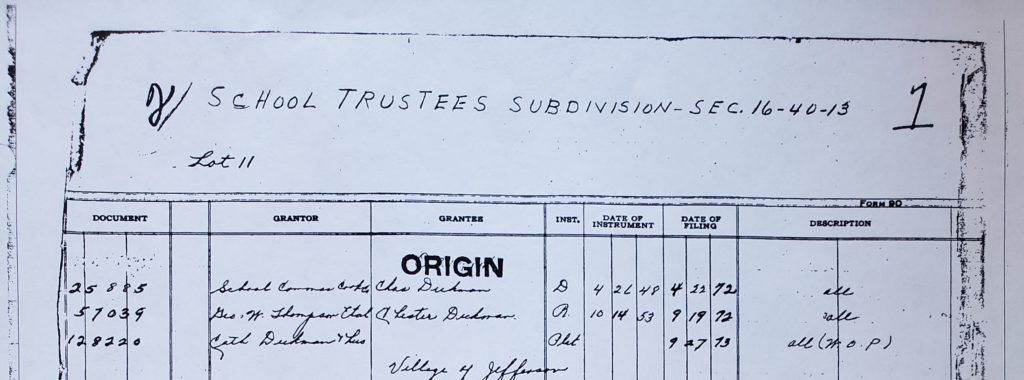
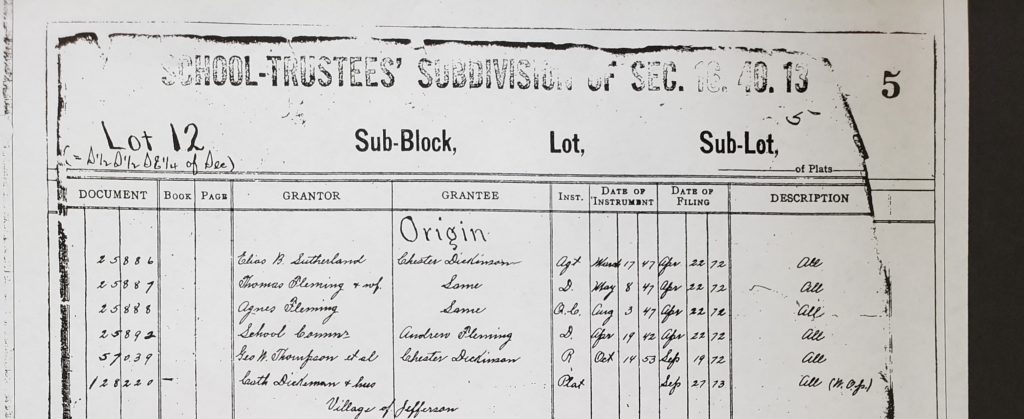
Congratulations! I enjoyed this immensely.
Under a bit of “insomnia”, due to vaccinations, I am so inexorable with your historian investigation! Your words flow….Wow! So interesting…. Thank you so much for dedicating time to find out and share your findings about our neighborhood. It sure seems like very difficult and complicated detective work. Can’t wait for next chapter!
Thanks again,
Lilly
And there you have it, all the way down the deep rabbit hole and back up again with all the information that we never thought possible to find. You should be a treasure hunter!
Thanks for the good write up.
This is soooooooooo much work and soooooo interesting. You were meant to be a detective. Favorite quote “Maybe it’s in lands”!!!!!